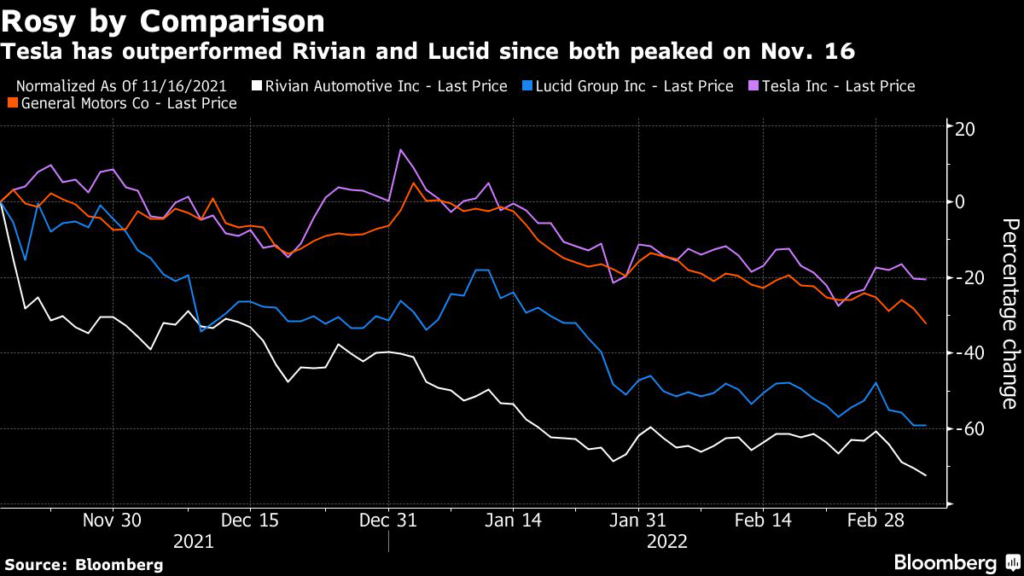(Bloomberg) — With oil soaring and prices at the gas pump rising along with it, investors who want to bet on electric vehicles have a choice: Tesla Inc. or, well, no one.
The recent rout in EV stocks has left the richly valued industry leader and world’s largest electric-vehicle maker well ahead of its upstart challengers. The chasm was apparent last week when two of the biggest U.S. publicly traded EV startups — Rivian Automotive Inc. and Lucid Group Inc. — disclosed supply-chain disruptions, leading to steep selloffs in both stocks.
The growing struggles for everyone but Tesla are coming at a time when they should be flourishing. Oil prices are surging, making electric cars more attractive, and even President Biden is calling for greater adoption of EVs.
But oil isn’t everything. With the war in Ukraine upsetting supply chains and the Federal Reserve about to raise interest rates, investors are wary of risk and closely scrutinizing unprofitable companies. So there aren’t a lot of options in electric-vehicle stocks.
“Tesla right now is the only EV company that has a demonstrable, viable business,” Steve Sosnick, chief strategist at Interactive Brokers LLC, said in a phone interview. “All the other ones are still concept stocks.”
To Sosnick’s point, Rivian and Lucid delivered about 1,000 vehicles last year combined. Meanwhile, Tesla sold nearly a million vehicles in 2021.
Just a few months ago, Rivian was being touted as the next Tesla with a market value that was bigger than Ford Motor Co.’s. Yet last week’s disclosure that the electric pickup-truck maker is raising prices due to higher costs as a result of component shortages sent its stock plunging. The shares plunged 30% from Tuesday to Friday, even after the company rolled back those hikes, and are down over 70% from a November peak, erasing more than $100 billion in value.
Lucid dropped 14% on Tuesday, after it lowered its production targets for 2022, saying it was facing “extraordinary” challenges with logistics and its supply chain. The stock continued falling through the week and is now down 59% from a November high.
Tricky Bet
“The smaller emerging EV manufacturers are at a disadvantage due to lack of manufacturing process experience,” said Charles East, senior equity strategy analyst at Truist Advisory Services. The challenge is particularly acute for the EV newbies, which need to ramp production and sell the cars in order to slow their cash burn, East added.
Tesla hasn’t been immune to supply chain issues, but Elon Musk’s company has managed to navigate the challenges better than peers so far. On Friday, the company’s factory in Germany was approved, and on Thursday Japanese national broadcaster NHK reported that Panasonic Corp. plans to build a U.S. factory to make lithium-ion batteries for Tesla.
While the company’s shares are down more than 20% this year, Tesla still commands a hefty market capitalization of $866 billion and has the fifth biggest stock on the S&P 500 Index. Its price relative to projected profits has been cut in half over the past three months, but it’s still trading at 79 times earnings expected in the next 12 months — more than three times the Nasdaq 100 average.
This is the quandary for investors. Tesla remains a tricky bet due to its valuation, volatility and the risk of competing EVs on the way from other companies. But if you want to bet on electric vehicles, in many ways it’s the only game in town.
“I don’t think there is any real Tesla-beater on the medium-term horizon” said David Jones, chief market strategist at Capital.com. “In an ideal world you would have a mid-range priced car with a charging infrastructure out there. And no one does.”
More stories like this are available on bloomberg.com
©2022 Bloomberg L.P.











